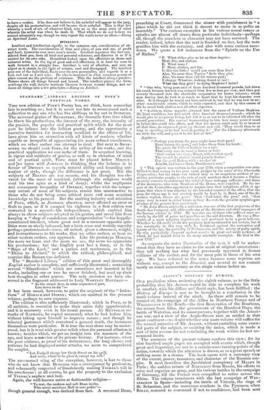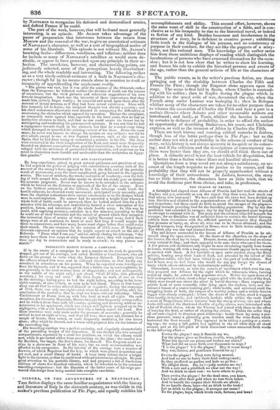ALISON'S HISTORY OF EUROPE.
Oca prediction when reviewing the eighth volume, as to the little probability that Mr. ALISON would be able to complete his work in another, with his diffuse and florid style, has been fulfilled : the History of Europe is now to be brought to a conclusion in the tenth volume instead of the ninth. As there still remain to be treated of, the campaign of the Allies in Northern France and of WELLINGTON in the South—the first Restoration of the Bourbons, the return from Elba, the government of the Hundred Days, the battle of Waterloo, and its consequences, together with the Ameri• can war, and a view of the Anglo-Saxon race as settled in that great continent—we doubt whether one more volume will suffice for the rotund narrative of Mr. ALISON, without curtailing some essen- tial parts of the subject, or omitting the index, which is made a sort of faint excuse for not concluding the work within its last an- nounced limits.
The contents of the present volume confirm this view ; for its nine hundred ample pages are occupied with events which, though great and important, are not in a certain sense turning-points of the action, towards which the attention is drawn, as to a great speech or striking scene in a drama. The book opens with a summary view of the extent, power, resources, and character of the Russian em- pire. It next describes the Jacobinical conspiracy of MALET in Paris ; the sudden return of NAPOLEON from Russia, his efforts to raise and organize an army, and his various battles in the campaign of Germany, till the French were compelled to retire across the Rhine. The volume terminates with the last campaign of War.- LINGTON in Spain—including the battle of Vittoria, the siege of St. Sebastian, and the numerous combats in the Pyrenees, when Sour.; restored to command if not to confidence, had been sent
by NAPOLEON to reorganize his defeated and demoralized armies, and defend France if he could.
The part of the work, however, that will be found most generally interesting, is an episode. Mr. ALisoN takes advantage of the pause of preparation that intervenes between the return from Moscow and the renewal of the war, to give an anecdotical estimate of NAPOLEON'S character, as well as a sort of biographical notice of some of his Marshals. This episode is not without Mr. Ausores besetting faults—diffuseness, wordiness, and inflation ; neither does he include so many of NAPOLEON'S satellites as would seem de- sirable, or appear to have proceeded upon any principle in their se- lection. The anecdotes, however, and characterizing-points, are judiciously selected, some of the perceptions keenly discriminat- ing, and the whole readable and interesting. The following strikes us as a very nicely-critical estimate of a fault in NAPOLEON'S cha- racter; though he by no means stands alone in aversion to truth or incapacity of apprehending the unpleasant reality. " His genius was vast, but it was after the manner of the Orientals rather than the Europeans: he followed neither the dictates of truth nor the lessons of experience, but the vivid pictures and vehement suggestions of his own fervent imagination. Such was the intensity of these impressions, that they made him entirely forget reality; he reasoned and acted upon them after the manner of insane persons, as if they had been actual existences. Ideas with him instantly led to desire; his incipient thought was already a passion ; and his chief endeavours afterwards were directed to conquering the difficulties or overcoming the obstacles which opposed its execution. Thence the complaint, BO commonly made against him, especially in his later years, that he had an instinctive aversion to truth, and that no one could secure his favour but by anticipating and confirming his preconceived opinions. It was not that he had a repugnance towards truth in the abstract, but that he resisted every thing which deranged or unsettled the existing current of his ideas. From the same cause, he never was known to change his opinion on any subject ; nor did he ever admit, except in one or two flagrant instances, such as the attack on Spain, that he had done wrong or committed a mistake in his life. His ideas were conceived in the vivid imagination of the East, and much more frequently founded on abstract conceptions than practical observation; but they were de- veloped with the strictness of geometrical demonstration, and engraven on his mind in characters more durable and unalterable than the sculptures on Egyp- tian granite." NAPOLEON'S EYE AND CALCULATION.
By long experience, joined to great natural quickness and precision of eye, he had acquired the power of judging with extraordinary accuracy both of the amount of the enemy's force opposed to him in the field, and of the probable result of movements, even the most complicated, going forward in the opposite armies. The roar of artillery, the smoke and rattle of musketry, even the fall- ing of balls around him, were alike unable to divert his steady gaze or disturb his accurate judgment. Never was he known to be mistaken in the estimate which he formed on the distance or approach of the fire of the enemy. Even on the furthest extremity of the horizon, if his telescope could reach the hostile columns, he observed every movement, anticipated every necessity, and from the slightest indications drew correct conclusions as to the designs which were in contemplation. No sooner had he ascended a height from whence a whole field of battle could be surveyed, than he looked around him for a few minutes with his telescope, and immediately formed a clear conception of the position, forces, and intentions of the whole hostile array. In this way he could, with suprising accuracy, calculate in a few minutes, according to what be could see of their formation and the extent of ground which they occupied, the numerical force of armies of sixty or eighty thousand men; and if their troops were at all scattered, he knew at once how long it would require for them to concentrate, and how many hours must elapse before they could make their attack. On one occasion, in the autumn of 1813, some of Napoleon's Generals expressed an opinion that he might expect an attack on the side of Bohemia. " From what 1 can see," said he, calmly closing his telescope, " the enemy have there two corps of sixty thousand men ; they will require more than one day to concentrate and be ready to attack: we may pursue our march."
NAPOLEON'S HABITS DURING A CAMPAIGN.
If in the course of a campaign he met a courier on the road, he generally stopped, got out of his carriage, and called Berthier or Caulaincourt, who sat down on the ground to write what the Emperor dictated. Frequently then the officers around him were sent in different directions, so that hardly any remained in attendance on his person. When he expected some intelligence from his Generals, and it was supposed that a battle was in contemplation, he was generally in the most anxious state of disquietude; and not unfrequently in the middle of the night called out aloud, "Call D'Albe, (his principal secretary,) let every one arise." He then began to work at one or two in the morning; having gone to bed the night before, according to his inva- riable custom, at nine o'clock, as soon as he had dined. Three or four hours' Bleep was all that he either allowed himself or required ; during the campaign of 1813, there was only one night—that when he rested at Gorlitz, after the conclusion of the armistice, that he slept ten hours without wakening. Often Caulaincourt or Duroc were up with him hard at work all night. On such Occasions, his favourite Mamelukc Rustan brought him frequently strong coffee, and he walked about from dark till sunrise, speaking and dictating without in- termission in his apartment, which was always well lighted, wrapped up in his nightgown, with a silk handkerchief tied like a turban round his head. But these stretches were only made under the pressure of necessity : generally be retired to rest at eight or nine, and slept till two; then rose and dictated for a couple of hours; then rested, or more frequently meditated, for two hours alone; after which he dressed, and a warm bath prepared him for the labours of the succeeding day. His travelling-carriage was a perfect curiosity, and singularly characteristic of the prevailing temper of his disposition. It was divided into two unequal compartments, separated by a small low partition, on which the elbows could rest, while it prevented either from encroaching on the other : the smaller was for Berthier, the larger, the lion's share, for himself. The Emperor could re- cline in a dermease in front of his seat ; but no such accommodation was afforded to his companion. In the interior of the carriage were a number of drawers, of which Napoleon had the key, in which were placed despatches not yet read, and a small library of books. A large lamp behind threw a bright light in the interior, so that he could read without intermission all night. He paid great attention to his portable library, and had prepared a list of duodecimo editions of above five hundred volumes, which he intended to be his constant travelling companions : but the disasters of the latter years of his reign pre- vented this design from being carried into complete execution.



























 Previous page
Previous page